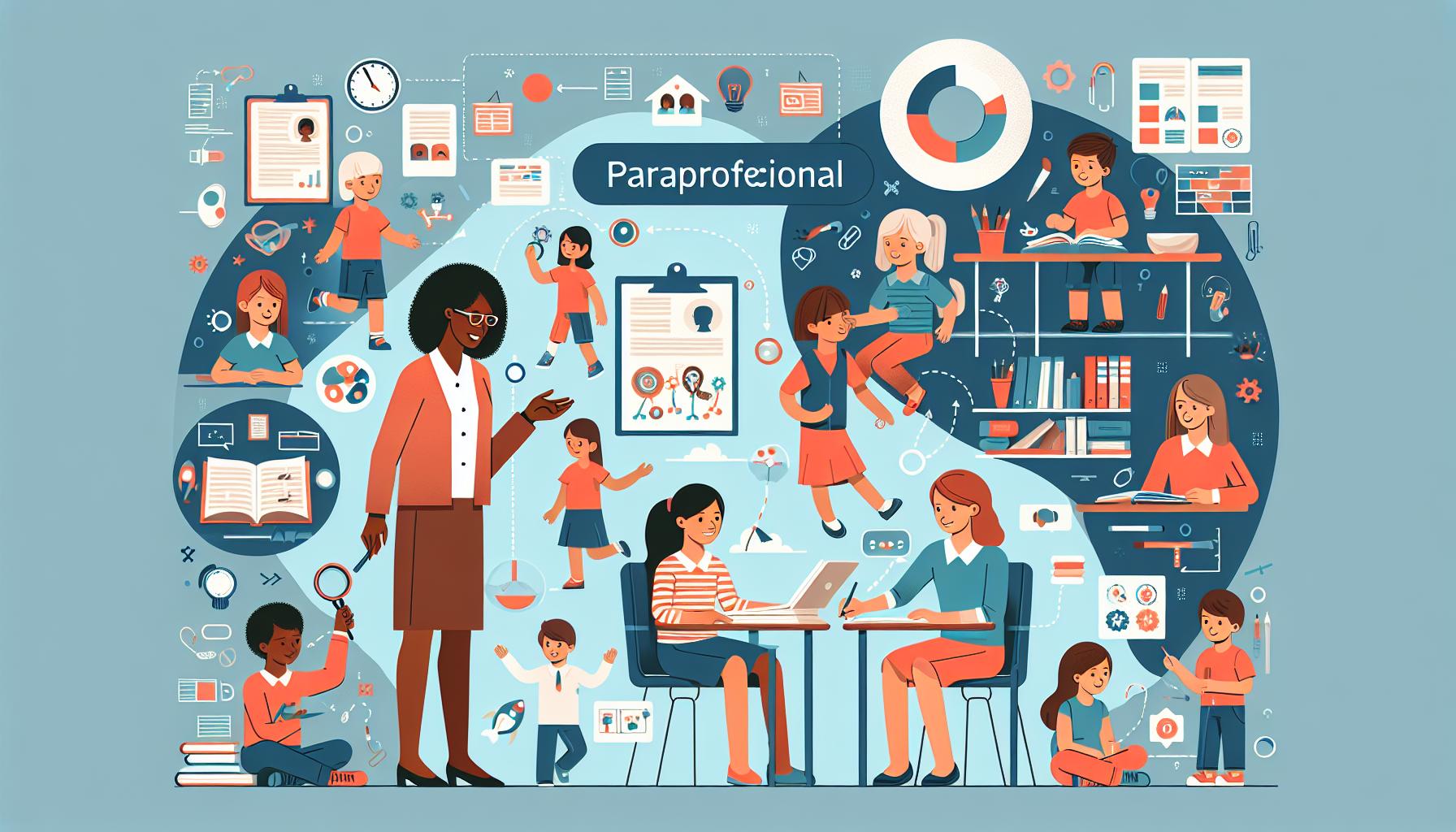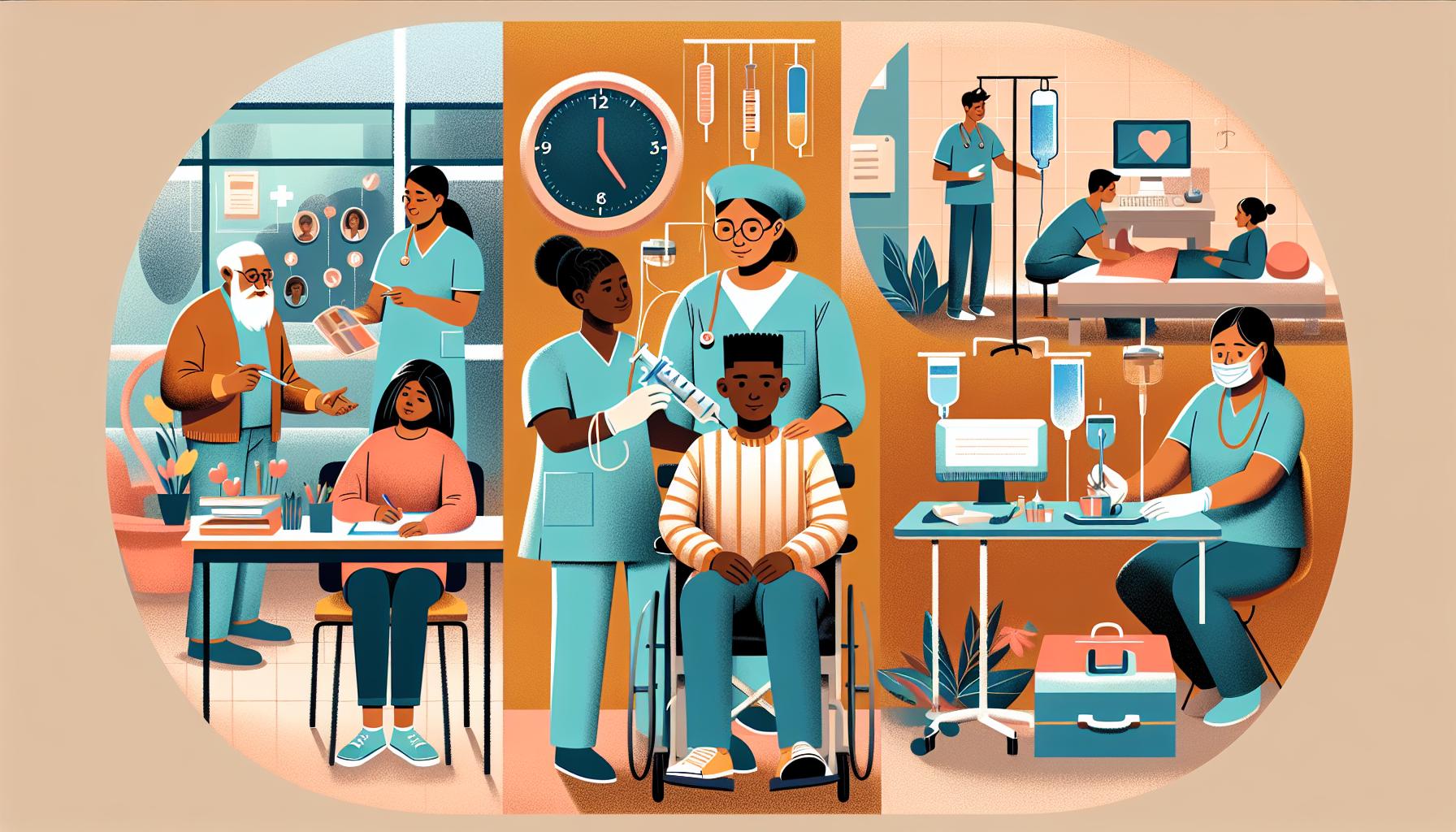Unveiling the Vital Role of Paraprofessionals in Education and Healthcare
Ever wondered what a paraprofessional does? You’re not alone. It’s a term that’s often thrown around in educational and healthcare settings, but many people aren’t quite sure what it means.
A paraprofessional, also known as a paraeducator or teacher’s aide, plays a crucial role in supporting professionals in various fields. They’re the unsung heroes, working behind the scenes to ensure everything runs smoothly.
Key Takeaways
- A paraprofessional is a trained individual who supports professionals in the execution of various tasks, primarily in the education and healthcare sectors.
- In education settings, paraprofessionals assist teachers with classroom management, lesson implementation and student guidance, playing a major role in ensuring classroom functionality.
- In healthcare, paraprofessionals help with administrative duties and basic patient care, playing an essential part in the healthcare system though often unseen.
- Paraprofessionals need specialized training, often a two-year degree or certification program, and require good interpersonal skills, patience, and a genuine desire to help others.
- The responsibilities of a paraprofessional differ based on their sector, but always involve the provision of support to professional staff members, aiding in their efficiency and the quality of care or education provided.
- Paraprofessionals are significant contributors to education and healthcare sectors, assisting individuals in receiving quality care or education, and filling necessary roles that ensure organisational functionality. They are considered a vital part of the system.
Who is a Paraprofessional?

In the simplest terms, a paraprofessional is a trained staff member who supports a professional in the execution of certain administrative duties. Think of their role as the supporting pillars behind successful professionals, especially in the education and healthcare sectors.
While the terms paraprofessional, paraeducator, and teacher’s aide are often used interchangeably, their roles may vary slightly based on the environment and responsibilities. In educational environments, a paraprofessional often works closely with a certified teacher, providing support in classroom management, lesson implementation, and student guidance. They’re the unseen gears that keep classrooms running smoothly.
Similarly, in healthcare settings, a paraprofessional may support healthcare professionals, like nurses and doctors, by performing administrative tasks or basic patient care under supervision. While it’s true they’re not the face you see in the forefront, their role is no less vital.
Each paraprofessional, whether they are in an educational or healthcare setting, receives training relevant to their field. Education often includes a two-year degree or certification program, equipping them with necessary specialised expertise. If you’re keen about embarking on a paraprofessional career, you should know that the job demands good interpersonal skills, patience and a genuine desire to help others.
Here are key points to remember about paraprofessionals:
- They cooperate with certified professionals and assist in routine tasks.
- They mostly work in education and healthcare sectors.
- They require specialized training that usually involves a two-year degree or certification program.
- They possess excellent interpersonal skills and display high levels of patience.
The role of a paraprofessional is vast and multi-faceted, often extending beyond its traditional definition. It’s a role that requires dedication, tenacity, and a healthy dose of altruism.
Responsibilities of a Paraprofessional

As a paraprofessional, you’re involved in a multitude of tasks and programs that aid and support professional staff members. These responsibilities may vary based on the field you’re in, be it healthcare or education.
For instance, in the education sector, your typical duties may include:
- Assisting teachers in creating lesson plans and educational materials
- Providing individual or small group instruction to students under a teacher’s guidance
- Monitoring and ensuring student safety in various settings, such as the playground, cafeteria, classrooms, or on field trips
- Keeping daily records of student attendance and performance
- Assisting students with special needs in accomplishing daily tasks or educational goals
In a healthcare setting, you may find yourself:
- Assisting healthcare professionals like nurses or doctors with routine tasks
-Supporting patient care plans, including basic tasks like bathing, grooming, and feeding - Conducting basic monitoring of patient health, such as measuring blood pressure, temperature, and pulse rate
- Transporting patients within the healthcare facility or to and from appointments
- Providing emotional support to patients and their families
The responsibilities involved in this role require not only proficiency in job-specific skills but also soft skills like patience, compassion, and good interpersonal skills. As the paraprofessional role can mean varying things in different settings, it’s crucial to understand the specifics of your role in your industry.
So, whether you’re in the throes of a bustling classroom or the heart of a busy hospital, the impact you can make as a paraprofessional is immense. With your assistance, professionals can focus to provide their services more efficiently, improving the overall quality of care or education.
The role of a paraprofessional is no small feat – it’s an essential backbone of the support system, making a difference in the lives of those who need it the most.
Qualifications and Training Required
Understanding a paraprofessional’s role is one thing. Yet, knowing the qualifications they need is equally vital. If you’re considering a career as a paraprofessional in either the educational or healthcare sector, you’ll need to meet certain criteria.
Typically, a paraprofessional should have at minimum a high school diploma or equivalent. In more specialized roles, like those in healthcare or special education, further education or training might be needed. This could include at least a two-year degree or specific certification programs.
Here’s a breakdown of the qualifications per sector:
| Sectors | Minimum Education | Optional Further Education |
|---|---|---|
| Education | High School Diploma | Two-Year Degree or Certification |
| Healthcare | High School Diploma | Two-Year Degree or Certification |
Moreover, beyond education, you’ll find that both soft and technical skills are key. From compassion to patience, excellent communication to organizational acumen, the list of skills is exhaustive and crucial.
Training doesn’t end after earning the required education or degree. Professional development is a constant for paraprofessionals. This could include on-the-job mentorship programs, online courses, workshops, seminars, or professional certifications. All go a long way in enhancing the value you bring to your professional sphere.
Just as the role of a paraprofessional varies, so too does the training and qualifications required. Depending on the industry, specific certification or additional coursework may be necessary. With this insight, you’re positioned to better plan for and kick off an inspiring career as a paraprofessional. Remember, learning is a continuous journey.
Settings Where Paraprofessionals Work

In your search to understand ‘what does a paraprofessional do’, the environments in which paraprofessionals ply their trade reveals as much about their duties as specific role descriptions. Depending on their certifications and specific skills, paraprofessionals find themselves in a variety of settings, ranging from traditional to specialized.
Educational Institutions consistently rank among the main employers of paraprofessionals. They provide assistance to teachers, often in special education or preschool settings, but don’t overlook general education classrooms where their skills also prove invaluable. Paraprofessionals in education assist in implementing lesson plans, managing classroom activities and providing critical one-on-one support to students who need it most.
In the Healthcare Sector, paraprofessionals predominantly work in home health care, hospitals, and assisted living facilities. As health paraprofessionals, they act as supportive pillars to the mainstream healthcare professionals. Their tasks may include keeping patient records, helping with basic care like monitoring vitals or mobility assistance, and lending a hand with administrative tasks.
Social Services also frequently employ paraprofessionals. In these roles, they gather research, assist clients in accessing services, and sometimes take leading roles in facilitating community programs. It’s in these roles where the soft skills, such as empathy and active listening, really shine through.
Finally, an increasing number of paraprofessionals are also found in Corporate Settings. They provide essential support in various areas like human resources, project management, and training and development roles.
Remember, where you end up depends heavily on your specific skills, interests, and certifications. Different settings carry unique responsibilities and challenges so it’s important to know where your strengths can be best utilized. As you navigate through your paraprofessional career, don’t forget the importance of continuous learning and professional development.
Importance of Paraprofessionals in Education and Healthcare
Paraprofessionals serve as critical links in two key sectors – education and healthcare. In each environment, their role extends beyond administrative or assistive tasks. Yes, they’re fundamental to upholding the system’s integrity and ensuring all individuals receive quality care or education.
In education, paraprofessionals often play supportive roles in classrooms. They assist teachers, work closely with students, and facilitate learning in various ways. Imagine a classroom with diverse learners – those with special needs, English language learners, and students with different learning styles. The paraprofessional is there to aid each child, catering to unique needs and ensuring no one is left behind. The presence of paraprofessionals can dramatically enhance students’ academic experience and their overall school environment.
On to the healthcare sector. Paraprofessionals are key team members in hospitals, clinics, and elder care facilities. They support the work of doctors, nurses, and other medical staff in a range of roles. You’ll find them assisting with medical procedures, providing patient care, and helping with administrative duties. Their hands-on care often forms a vital part of a patient’s recovery or ongoing treatment. Plus, they’re often the first point of contact in many healthcare scenarios.
To truly grasp this, consider some significant stats. Let’s look at the educational and healthcare sectors’ reliance on paraprofessionals:
| Sector | Number of Paraprofessionals as of 2020 | Expected growth by 2030 |
|---|---|---|
| Education | 1.3 million | 4% |
| Healthcare | 4.8 million | 36% |
These figures show the integral role paraprofessionals play across both sectors. They underscore the necessity of their services and the foreseeably consistent demand for these vital roles in the coming years.
Remember, continuous professional development is a cornerstone of success in these roles. As you move forward in your paraprofessional career, embrace every opportunity to learn and grow. You’re not just building a career, you’re playing a crucial role in supporting those who need it most.
Conclusion
You’ve seen how paraprofessionals are the unsung heroes in education and healthcare. They’re not just administrators, they’re pivotal support systems enhancing academic experiences and aiding patient recovery. Their roles are diverse, yet united by the common thread of supporting others. It’s a challenging job that requires continuous learning and development. Yet, the impact they make, as reflected in the statistics, is undeniable. So, if you’re considering a career as a paraprofessional, know that it’s a role of immense significance and reward. You’ll be making a real difference, every day.
What is the role of paraprofessionals in education?
Paraprofessionals in education perform various tasks such as assisting teachers, supporting students with diverse needs, and enhancing the overall academic experience. They often work closely with special education students, providing individualized assistance to help meet learning objectives.
How do paraprofessionals contribute to healthcare?
In the healthcare sector, paraprofessionals play vital roles. They provide valuable support to medical staff, care for patients, and actively participate in the patient recovery process. Their involvement is crucial for efficient healthcare systems.
What statistics are presented in the article about paraprofessionals?
The article does not specify the exact statistics. However, it mentions that both the educational and healthcare sectors heavily rely on paraprofessionals, indicating the significance of their roles.
How crucial is continuous professional development for paraprofessionals?
Continuous professional development is vital for paraprofessionals. The roles they occupy in education and healthcare are complex, and they need to stay current with the latest practices and regulations. This constant learning helps them excel in their tasks.
What does the article stress about learning opportunities for paraprofessionals?
The article emphasizes the importance of paraprofessionals in embracing learning opportunities. These prospects allow them to grow professionally and enable them to provide better support to those they serve in education and healthcare contexts.
The post Unveiling the Vital Role of Paraprofessionals in Education and Healthcare appeared first on Special Education Journey.
Unveiling the Vital Role of Paraprofessionals in Education and Healthcare published first on https://special-education-journey.com/
Comments
Post a Comment